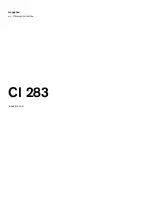
GB
4
4. Unscrew nozzle "A" using a
7 mm socket spanner. Use a
spanner with a 7 mm opening
to unscrew nozzle "B" (see
figure). Replace the nozzles
with models which are suitable
for use with the new type of
gas (see table 1).
5. Replace all the components by following the
above instructions in reverse.
Adjusting the burners primary air :
Does not require adjusting.
Setting the burners to minimum:
1. Turn the tap to the low flame position.
2. Remove the knob and
adjust the adjustment screw,
which is positioned in or next
to the tap pin, until the flame
is small but steady.
3. Having adjusted the flame to the required low
setting, while the burner is alight, quickly change
the position of the knob from minimum to
maximum and vice versa several times, checking
that the flame does not go out.
A
B
DATA PLATE
Electrical
connections
(see data plate )
This appliance conforms to the
following European Economic
Community directives:
-2006/95/EEC dated 12/12/06 (Low
Voltage) and subsequent
amendments
- 2004/108/EC dated 15/12/04
(Electromagnetic Compatibility)
and subsequent amendments
- 93/68/EEC dated 22/07/93 and
subsequent amendments.
- 2009/142/EEC dated 30/11/09
(Gas) and subsequent
amendments.
- 2002/96/EC and subsequent
amendments.
4. Some appliances have a safety device
(thermocouple) fitted. If the device fails to work
when the burners are set to the low flame setting,
increase this low flame setting using the adjusting
screw.
5. Once the adjustment has been made, replace the
seals on the by-passes using sealing wax or a
similar substance.
If the appliance is connected to liquid gas, the
regulation screw must be fastened as tightly as
possible.
Once this procedure is finished, replace the old
rating sticker with one indicating the new type of gas
used. Stickers are available from any of our Service
Centres.
Should the gas pressure used be different (or vary
slightly) from the recommended pressure, a suitable
pressure regulator must be fitted to the inlet pipe (in
order to comply with current national regulations).






























